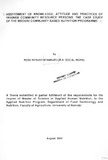| dc.description.abstract | The purpose of this study was to assess the knowledge, attitude and practices of the
Community - Based Nutrition Programme's trained community resource persons
(CRPs) in Mbooni and Kisau Divisions of Makueni District. The study was to assess
particularly, the Community Health and Nutrition Workers' (CHNWs) current level of
knowledge and also determine their attitude and practices towards health and nutrition
issues. In addition, it also assessed the community's attitude towards the community
health and nutrition workers and the other groups of community resource persons and
their work within the community. The study was carried out in two divisions of
Makueni district namely; Mbooni and Kisau which were purposively selected and a
total of 72 health and nutrition workers who were trained between 1996-1999, by the
Community - Based Nutrition Programme (CBNP) comprised the study population.
A questionnaire divided into four main sections namely, demographic, knowledge,
attitude and practices based on the curricula used for training were administered to all
the CHNWs. Six Focus Group Discussions were conducted to provide information on
the attitude and practices of the community health arid nutrition workers and also
verify the information collected by the use of a questionnaire. The Focus Group
Discussions were conducted with three groups, mothers with children under five years
old, Participatory Approach to Nutrition Security (PANS) teams from both divisions,
and community members who hold public responsibilities. Direct observation was
done to collect information on the conditions of some of the tools used for growth
monitoring, record keeping and existing records were used to check on new growth
monitoring centres that have come up through the community health and nutrition
workers and community" initiative. It was also to check on whether any nutrition
education was given at the growth monitoring centres and whether those who brought
the children were involved in weighing the children.
A grading system was established and from the scores, percentages were derived
and a cut off point set. All those who scored, half and above the expected points
were classified as having adequate knowledge, while those who scored below half of
the expected score had inadequate knowledge. The findings indicate that half of the
interviewed community health and nutrition workers do not have adequate knowledge,
while the other, half had adequate knowledge. This meant that half of them have
forgotten what they were taught, even though it was noted that these were people with
fairly good formal education.
In attitude and practices majority of them were positive and affirmed, that the training
received from the programme was adequate and had helped them in their service
delivery. It was good and had helped them as individuals as well their families and
community, since a majority willingly shared it. They were happy with their work and
acknowledged that the community held them in high esteem. However, data implied
that Kisau division performed better with a statistically significant difference in the total
practice score than Mbooni (p < 0.001). There was also a significant difference in the
total knowledge score between those who had received refresher training compared
to those who had not received any other a part from that given by the Community -
Based Nutrition Programme. Those who had refresher training scored better than,
their counterparts (p =0.006). Also those above 35 years of age scored higher as
opposed to those less or equal to 35 years (p =< 0.03).
The findings also indicate that, the community health and nutrition workers faced
some challenges especially with respect to the work being tedious, irregular growth
monitoring attendance and some people not taking advice and behaving like they
'know it all'.
The study therefore, recommends that the programme should conduct regular
refresher training for those already trained, train more new community health resource
persons to ease the workload. Special emphasis to be put on the importance of
nutrition education, active involvement of mothers and guardians in weighing the
children and proper record keeping. The programme should also carry out regular
supervision to motivate the community resource persons as well as giving timely feed
back to reports sent to the district staff. The programme should also work more
closely with the two Participatory Approach to Nutrition Security (PANS) teams who
are the technical resource teams at the ground. They supervise the implementation of
community activities as well being the link between the community and service
providers. This will improve the health and nutrition status of the community and
enhance collaboration with the relevant ministries whom these teams represent.
There is need to motivate the Cbmmunity Resource Persons (CRPS) by the
community and the programme. The community should be continually sensitized on
the work of these people and since they appreciate the work and services offered they
need to look for ways of sustaining them. The programme should incorporate
exchange tours to enable them to exchange ideas and learn from the other project
areas. They could be also provided with information, education and communication
materials (posters, brochures, books), this will make them feel that their work is not
inferior, but important to them and the community. | en |

